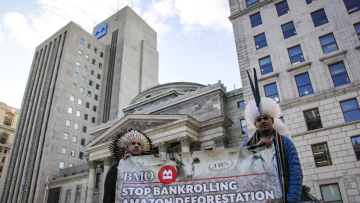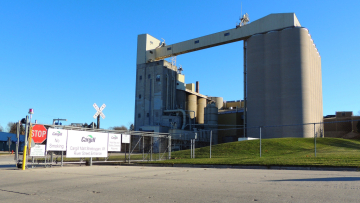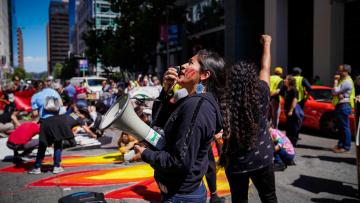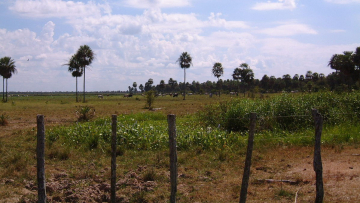The New Merchants of Doubt: How big meat and dairy avoid climate action

18 July 2024 -The new report published by Changing Markets reveals the tactics of Big Meat and Dairy companies to delay, distract, and derail action on transforming the food system, mirroring strategies used by the tobacco and fossil fuel industries.
Read the full report here
The Urgency of Reducing Methane Emissions
Food systems are responsible for around a third of global greenhouse gas emissions, with approximately 60% coming from animal agriculture, the largest source of man-made methane emissions. The science is clear: we cannot meet the Paris Agreement’s 1.5-degree temperature increase target without significantly cutting methane emissions and reducing animal product consumption. The agricultural sector is a major climate change contributor through methane and nitrous oxide pollution and deforestation. Over 200 climate scientists believe livestock emissions must peak by 2025 in high- and middle-income countries and cut globally by 50% by 2030.
Agricultural Exceptionalism and Influence
Despite their huge negative impact on climate, biodiversity and human health, big meat and dairy corporations have largely been off the hook, regarding environmental regulation. Our investigation reveals that the industry has largely succeeded in convincing policymakers of agricultural exceptionalism, getting several concessions, exemptions and delays to climate action in the sector.
In several countries, the industry managed to convince policymakers to adopt all-carrots-and-no-sticks approaches to regulating agricultural emissions, which means that any change in farming practices is voluntary and depends on additional financial incentives, while significant public subsidies that the sector already receives remains off limits for any reforms. Unfortunately, current agricultural subsidies largely support the existing status quo of big farms, benefiting large companies in the middle of the chain (so-called Big Ag) and putting small family farms out of business.
To better understand Big Ag’s influence, the report analysed actions by 22 of the biggest meat and dairy companies across four continents (including Arla, Bigard, Cargill, DFA, Danish Crown, Danone, DMK, Fonterra, FrieslandCampina, Itoham, JBS, Lactalis, Marfrig, Mengniu, Nestle, NH Foods, Group OSI, Group Saputo, Tyson, Vion, WH Group, and Yili) looking at their voluntary climate commitments, greenwashing claims, investments in advertising versus low-carbon solutions and their political engagement, which included political donations, meetings with politicians, money spent on lobbying, as well as what narratives they are pushing either directly or indirectly through the work of industry associations.
The report analysed how the industry is co-opting science by funding its own research to downplay the sector’s impact on climate and promoting its preferred solutions, mostly in the form of voluntary technological fixes. The report provides a detailed analysis of different corporate narratives to consumers, media, and policymakers, showing how the industry distracts us with the smokescreen of voluntary climate targets, environmentally friendly products, and seemingly ambitious investments in emissions reduction technologies, while behind the scenes, it mobilises significant resources to delay and derail progressive environmental legislation. Some of the exemples include:
- Distracting tactics: greenwashing and targeted advertising to Gen Z; mis and disinformation online and healthwashing meat and dairy; weak net-zero targets; and investment in the science that supports Big Meat and Dairy’s agenda, so-called agrodemia.
- Delaying tactics: promotion of voluntary approach to agricultural emissions, promotion of techno-fixes as a silver bullet solution, while in reality companies spend more money on advertising than on climate solutions.
- Derailing tactics: Direct and indirect lobbying to derail or weaken legislation, political donations, conflicts of interests, revolving doors, intimidation, co-opting farmer protests, and using other crises, like the war in Ukraine, to block environmental policies.
Putting the tactics into play
The report also investigates how these tactics play out in real-time in different geographies. The EU and the US are powerful examples of how the political influence of Big Meat and Dairy and their industry groups have resulted in the sector setting its own regulatory agenda, translating into all-carrots-and-no-sticks approaches to emissions from agriculture.
These two powerful regions, where 13 of the 22 investigated companies have headquarters, are also key in setting the global agenda. The influence of Big Meat was clearly visible in the language of the Global Methane Pledge, where methane mitigation from agriculture is confined to “incentives and partnerships with farmers” – the victory that the meat industry celebrated.
Similarly, our FAO case study shows that the industry successfully pushed their narratives on the primacy of increasing efficiency in the sector through various techno-fixes over the scientific consensus that the highest emissions savings potential comes from dietary shifts towards more plant-rich diets. Two important reports that the FAO published during COP28 in Dubai, Pathways towards lower emissions and Achieving SDG 2 without breaching the 1.5 °C threshold: A global roadmap, were criticised for adopting industry-friendly narratives to food systems transformation and significantly downplayed the potential of dietary shift.
Conclusions don't leave any doubts
This report shows the power of Big Meat and Dairy lobby groups, fighting across the world to maintain status quo, blocking climate action, such as dietary shifts and the adoption of alternative proteins. While tactics resemble Big Oil, which have now been widely discredited as harming public interest, Big Meat and Dairy influence still flies under the radar, and they continue to benefit from agricultural exceptionalism. In the US, about 800 times more public funding and 190 times more lobbying money goes to animal-source food products than alternatives. In the EU, about 1,200 times more public funding and three times more lobbying money goes to animal-source food products. Alternative proteins are a promising technology, but they received only a fraction of investments deployed in other sectors. This is blocking progress towards climate solutions in the food sector.
A report by the Boston Consulting Group found that per dollar invested, plant-based proteins have the highest CO2 savings of any sector and have ‘ready consumer interest’. Market trends also show that there is a huge appetite for plant-based foods. In 2022, a survey covering 31 countries found a global average of 44% of consumers who were ‘likely to eat less meat or replace it with alternatives to limit their contribution to climate change’. Millennials are also more likely to try not to eat meat, and 22% of the world’s population are vegetarian, while actions like Veganuary have been increasing year on year, with an estimated 25 million people taking part in January 2024.
The climate science is clear: actions that we take in this decade will define temperatures and the world we live in for the decades to come. The livestock sector is both a significant source of GHG emissions and uniquely vulnerable to the impacts of climate change that are already being felt by farmers and ordinary people everywhere. The studies show that as temperatures increase further, climate impacts will only get worse, with significant financial implications for the sector, as well as with potential catastrophic food security implications across the world, impacting the most vulnerable the most. As the industry fights to resist any reduction to livestock numbers and the transition to healthier, more plant-based diets, we must take urgent action to regulate the industry, reduce emissions and invest in alternatives. As Big Tobacco and Big Oil are scrutinised, Big Ag should be too.
Read more media coverage in Bloomberg, The Grocer, Green Queen, and Politico.





